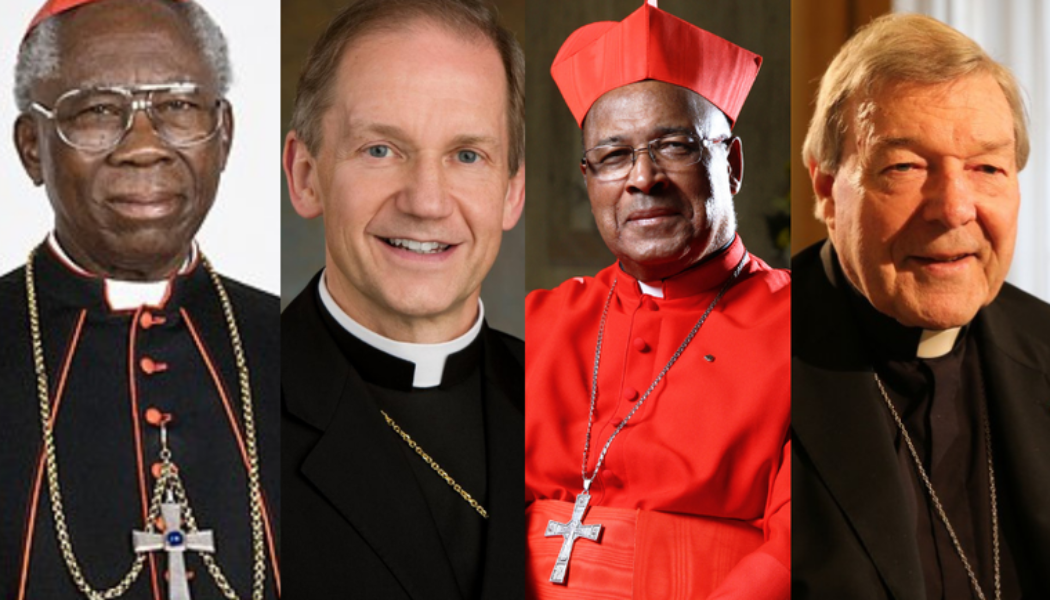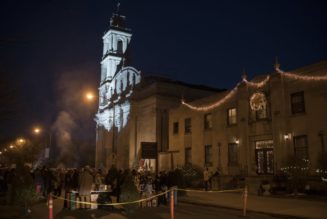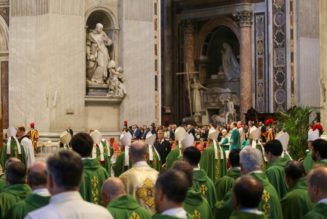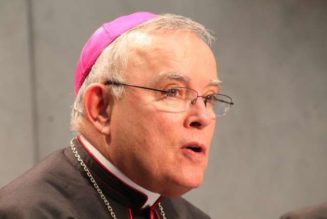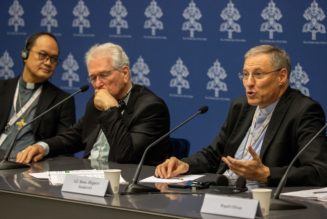
Seventy-four Catholic bishops from four continents have signed a “fraternal open letter” to their episcopal counterparts in Germany, expressing concern over the German Church’s controversial “Synodal Path.”
While noting the need for reform in the life of the Church, the letter states that “Christian history is littered with well-intended efforts that lost their grounding in the Word of God, in a faithful encounter with Jesus Christ, in a true listening to the Holy Spirit, and in the submission of our wills to the will of the Father.” The letter states that Germany’s controversial “Synodal Path” — a reform effort, backed by the majority of German bishops, that calls for fundamental changes to the Church’s teaching on sexuality, blessings for same-sex sexual unions, and the priestly ordination of women — “risks leading to precisely such a dead end.”
The letter, released publicly this morning at 8am ET, follows other recent expressions of fraternal concern over the German “Synodal Path,” also known as the “Synodal Way.” On Feb. 22, Archbishop Stanisław Gądecki, the president of the Polish Bishops’ Conference, wrote a letter to the German bishops expressing his “deep concern and anxiety” over the process, while the Nordic bishops cautioned against “capitulation to the Zeitgeist” in a March 9 letter.
Today’s letter, however, is differentiated by the international scope — and in some cases, prominence — of its signatories. Bishops from Africa, Australia, Europe and North America, 10 countries in total, have added their names to the letter. The list includes four cardinals — Nigerian Cardinal Francis Arinze, U.S. Cardinal Raymond Burke, South African Cardinal Wilfred Napier and Australian Cardinal George Pell — 15 archbishops, and 55 bishops.
Globalized Scandal
The international character of the letter’s signatories reflects the international problem these bishops believe the German “Synodal Way” presents. The opening line states that “in an age of rapid global communications, events in one nation inevitably impact ecclesial life elsewhere.”
“Thus, the ‘Synodal Path’ process, as currently pursued by Catholics in Germany, has implications for the Church worldwide,” the text of the letter states, including “the local Churches which we pastor and the many faithful Catholics for whom we are responsible.”
Cardinal Napier told the Register that he signed the letter out of concern that the Church in Germany is going in a different direction than the rest of the Church, “particularly when it comes to issues that are going to have repercussions on the Church in every part of the world.”
The South African cardinal expressed specific concern over the Synodal Path’s deviation from established teaching related to sexuality and said that what happens in Germany “absolutely” has an impact on life in his country. In fact, he said that at the meetings of the Symposium of Episcopal Conferences of Africa and Madagascar, “there is always concern about how what is taking place in the Church in the West is [having an] impact upon the Church in Africa, and in particular where the impact is of a negative nature.”
Cardinal Pell told the Register that the German Synodal Path’s departure from orthodox teaching on sexual morality, which he described as going beyond the usual “nods and winks and suggestions” to “an explicit disavowal and rejection of Christian teaching,” will likely give cover to similarly heterodox efforts during the July 2022 meeting of the Australian Church’s Plenary Council.
“I don’t think it threatens to be as extreme as the German one, but these renegade teachings are significant for us in Australia and for our council,” the cardinal said.
Bishop Thomas Paprocki of Springfield, Illinois, one of the organizers behind the drafting and promotion of the letter, said that he signed this “fraternal letter of concern” because he felt a responsibility to be clear to the people of his diocese that “what is coming out of this German Synodal Path is not correct.”
“People are aware that the Catholic Church in Germany is condoning practices and fostering teachings that are contrary to the Catholic faith,” said Bishop Paprocki of the potential for globalized scandal. “Well, then, other people in other countries are going to say, ‘If they can do it over there, why can’t we do that?’”
Fraternal Correction, Papal Assistance
Bishop Paprocki said the letter is an instance of the kind of fraternal correction described by Christ in Matthew 18, its sense of collegiality strengthened by the fact that it comes from beyond one episcopal conference or just one country.
He also described the letter as an aid to Pope Francis, who previously wrote to German Catholics regarding the Synodal Path, urging them to avoid temptations to compromise the Gospel in their efforts of reform.
“I think we, as brother bishops, have a responsibility to be of assistance to the Holy Father in this regard, trying to address some concerns that we have about what’s happening with the Catholic Church in Germany, and hope that [the German bishops] will respond,” said Bishop Paprocki.
The multinational bishops’ letter expresses several concerns with the German “Synodal Way”: undermining the credibility of Church teaching and authority; drawing inspiration primarily from sociological analysis and political ideology; replacing a Christian notion of freedom with “autonomy”; lacking “the joy of the Gospel”; an overly bureaucratic, anti-evangelical tone; and a focus on power that “suggests a spirit fundamentally at odds with the real nature of Christian life.”
The last “and most distressingly immediate problem” listed is how the “Synodal Path” risks undermining the credibility of the very concept of synodality — particularly relevant at a time when Pope Francis is attempting to lead the universal Church through a “synod on synodality.”
“By its destructive example, [Germany’s Synodal Path] may lead some bishops, and may lead many otherwise faithful laypeople to distrust the very idea of ‘synodality,’ thus further impeding the Church’s necessary conversation about fulfilling the mission of converting and sanctifying the world.”
More Signatures Sought
Currently the letter’s 74 signatories include 48 Americans, including seven archbishops: Archbishop Paul Coakley of Oklahoma City, Archbishop Salvatore Cordileone of San Francisco, Archbishop Joseph Naumann of Kansas City, Kansas, Archbishop Alexander Sample of Portland, Oregon, Archbishop Emeritus Joseph Kurtz of Louisville, Kentucky, Archbishop Emeritus Charles Chaput of Philadelphia and Archbishop Samuel Aquila of Denver, who previously wrote his own criticism of the first texts to emerge from the German “Synodal Path.”
“The German Church does not and cannot speak for the universal Church, and I am encouraged to see so many bishops speak out in defense of the faith,” said Archbishop Aquila in a comment provided to the Register.
Notably, the letter does not include the signature of Archbishop José Gomez, the president of the U.S. Conference of Catholic Bishops. Additionally, none of the six cardinal metropolitans in the U.S had signed the document at the time of its publication.
Most of the letter’s non-U.S. signatories hail from Africa, especially Tanzania, which has 14 bishops included.
The letter, which originated among a group of U.S. bishops, spread to other possible signatories through word of mouth. Widespread dissemination was limited by a desire to keep the contents of the letter confidential before its publication, but Bishop Paprocki is clear that the letter is “not meant to be a closed list.”
In fact, the letter’s organizers have provided the email address [email protected] where other bishops can request to add their names to the letter.
“My hope would be that other bishops who, for whatever reason, didn’t have an opportunity to [sign on previously] would not feel excluded, but, in fact, would feel they now have an opportunity to add their name to the list,” said Bishop Paprocki. “So I would hope to see that list continue to grow.”
In fact, by releasing the letter publicly after already securing 70-plus signatures, including the signatures of some internationally respected ecclesial figures, Bishop Paprocki believes that other bishops who might be concerned about departing from “the mainstream in terms of collegiality and communicating with fellow bishops” will have an easier time signing onto the letter than they would have by themselves.
“I think that this helps address those kinds of reservations or hesitations that a bishop might have, just seeing the number of bishops that are already on this and the names that are represented here.”
Ultimate Hope
Signatories who spoke to the Register said they hoped the letter would both lead to doctrinal clarity and preserve ecclesial unity.
Cardinal Napier said he expects the letter to generate widespread conversation among the African episcopate regarding Germany’s “Synodal Path” and its possible threat to Church unity.
“What we don’t want to see is the splitting up of the Church. I don’t think anybody wants to see that,” he said, including the German bishops.
The South African cardinal also noted that, because of the great respect African bishops have for Church authority and the Holy Father, he would expect even more outspokenness from the continent regarding Germany’s “Synodal Path” if it was perceived as going against the intentions of Pope Francis and threatening Church unity.
Cardinal Pell, for his part, insists that unity can only be built upon a shared commitment to the Apostolic tradition. He describes the errors advanced by the “Synodal Path” as a source of “moral confusion and relativism” that undermines authentic doctrinal unity. The Australian cardinal says it now “would be very appropriate, indeed necessary,” for the Congregation for the Doctrine of the Faith to provide a clarification regarding the problematic views being advanced in Germany.
“As successors of the apostles, we’ve got something of a duty to bear witness to the truth,” he told the Register.
Bishop Paprocki says the “ultimate hope” of the letter campaign is to have the German bishops see the widespread concern from their episcopal brethren and “reassess what it is they’re doing, getting back on course with the true teachings of the Church” — especially before the “Synodal Way” issues its final documents in February 2023.
The Springfield bishop mused that perhaps the German bishops thought their release of the “Synodal Path” draft documents would prompt other bishops from around the world to “get on board” with their controversial positions. Instead, he thinks the opposite has happened.
“What we see is an international response of bishops to the bishops of Germany, saying, ‘Brother bishops, you’re going down the wrong path, and we hope that you’ll get back on course.’”
Join Our Telegram Group : Salvation & Prosperity
